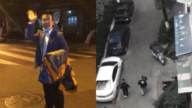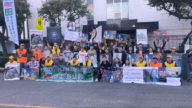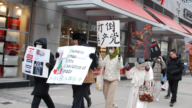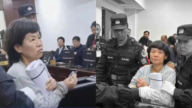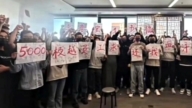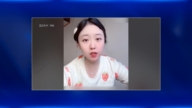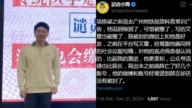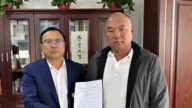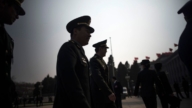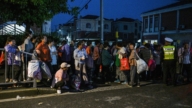【新唐人2014年01月24日讯】10年前,获“中国十大法治人物”称号的法律博士,现在却被中共当局以违反所谓《游行示威法》关押。日前,中国78名教授、律师和媒体人,集体建议对《游行示威法》进行审查,宣布它违宪。
10月23号,滕彪、程海、夏业良、章立凡、李大同等78名中国律师、教授和媒体人,在互联网发表公开建议书,要求即将召开的中共人大会议,对中共《集会游行示威法》进行违宪审查。
建议书说,《宪法》既然对公民享有基本人权和自由做出了承诺,就不能放纵违反公民权利和自由的法律法规继续存在。而现行《集会游行示威法》与《宪法》严重抵触,实质上剥夺了公民的集会游行示威的权利。
建议书还指出,将宪法权利设定行政许可,是《集会游行示威法》违宪的核心所在。政府有责任保障公民的宪法权利,而不是以“拒绝批准”将一切集会游行示威扼杀在萌芽状态,更不能滥用公权力,将正常行使宪法权利的公民以“非法集会”、“聚众扰乱公共场所秩序罪”等罪名构陷入狱。
24号正在开庭审理的许志永案,正是因为许志永律师与8位中国公民举牌,而被警方以“聚众扰乱公共秩序”的罪名刑事拘留。
10年前,许志永、滕彪等三位中国法学博士, 针对当年发生的“孙志刚事件”,发起了对《收容遣送条例》进行违宪审查的建议行动,最终迫使当局废止了这一恶法。这三位博士也因此被评选为年度“中国十大法治人物”之一。
执笔建议书的滕彪,在接受“2003年度十大法治人物”颁奖时,《央视》主持人问﹕“法治的力量是什么?”他回答,“是每一个人站起来为法治而斗争”。不过,当时在场的人都没有想到,几年后,滕彪被当局注销了律师资格证书,还遭非法拘禁多次,成了维权、异议份子、或新黑五类分子。滕彪曾经表示,他基本上成了“国家的敌人”。
中国法律学者滕彪:“《集会游行示威法》不废除的话,当局还会抓更多的人,我们这个建议出去,是希望《宪法》权利,不能够被下面的法律法规任意的剥夺。”
《宪法》规定:公民有言论、出版、集会、结社、游行、示威的自由。
不过1989年民运过后,中共制定了所谓《集会游行示威法》,其中规定:举行集会、游行、示威,必须依照本法规定向主管机关提出申请并获得许可。但是在3618个字的《集会游行示威法》中,有14处“不得”。
1998年,中国还签署了《公民权利和政治权利国际公约》,其中规定:“和平集会的权利应被承认,对此项权利的行使不得加以限制。”
滕彪:“《集会游行示威法》它剥夺了公民的游行示威权利。从条文上来看,它基本上都是限制这些条款,实践上,从来也没有批准过公民申请的游行示威。”
律师们的建议书指出,《集会游行示威法》实施近25年来,即使是三、五人诉求的游行申请,公安局也以“将严重破坏社会秩序”为由,作出不许可决定。
去年10个月中,至少有100人以上,因为集会活动被逮捕入狱。
北京维权人士叶红霞,向北京市公安局申请4天的游行示威,当局在规定时间内,没有出具反对禁止意见。
今年年初,叶红霞按申请,从建国门地铁西南角出发,沿途警车和便衣跟随。叶红霞顺利完成一天的游行示威活动后,被当局拘捕。
北京律师程海:“在游行示威的两天前,如果没有给你答复,就视同批准了,这批准有两种形式,一个是给你文件,一个是没有文件。”
建议书说,中国应该像其他国家一样,将集会游行示威的行政审批制改成“备案制”,也就是,当集会游行示威达到一定规模,公民“提前告知”公安部门,以便部署警力维持秩序,保障集会游行示威的顺利进行。
采访编辑/刘惠 后制/钟元
Demonstration Law Is Unconstitutional – Chinese Lawyers
A doctorate of law who was named one of China’s top ten
legal figures a decade ago is now imprisoned on charges
of violating of the so-called demonstration law.
Recently, 78 professors, lawyers and journalists
have collectively declared the demonstration legislature
unconstitutional and demand its re-evaluation.
On Oct. 23, 78 Chinese lawyers, professors and journalists
including Teng Biao, Cheng Hai, Xia Yeliang, Zhang Lifan,
and Li Datong created a public proposal on the web
calling for an investigation into the unconstitutional
demonstration law at the upcoming
National People’s Congress.
The proposal points out that the Constitution grants citizens
the basic human rights and freedoms;
Laws and regulations that indulge in violation
of civil rights and liberties cannot continue to exist.
The protest law is in serious violation of the Constitution
as it deprives the right of assembly and demonstration.
The proposal also points out that forcing citizens to obtain
an administrative license in order to demonstrate is at its core
unconstitutional.
The government has a responsibility to protect
the constitutional rights of its citizens rather than kill
the assembly and demonstration at its budding
by refusing to issue a permit.
In exercising the constitutional rights, government cannot
abuse public power and charge citizens with the crimes
of unlawful assembly or gathering a crowd
to disturb public order.
Xu Zhiyong’s case was precisely caused by the police
who charged attorney Xu and other Chinese citizens
who participated in the protest with gathering a crowd
to disturb public order.
10 years ago, three Chinese legal doctorates, Xu Zhiyong,
Teng Biao, and Yu Jiang proposed a re-evaluation
of the Custody and Repatriation Regulations based
on the Sun Zhigang incident.
Ultimately, they forced the authorities to repeal
this draconian law.
The three juris doctors were thus voted
on to the China’s Top Ten Legal Figures list.
During the award ceremony a CCTV host asked proposal
co-author Teng Biao, “How powerful is the rule of law?"
Teng replied, “Everyone stands up to struggle
for the rule of law."
However, no one would have imagined that a few years later,
authorities would revoke Teng Biao’s license to practice law.
He has been labeled an activist, dissident, a member of “the
new black five” and has been illegally detained many times.
Teng Biao has said that he has basically become
an enemy of the state.
Teng Biao, Chinese legal scholar: “As long as the
demonstration law exists, the authorities will continue
to make arrests.
Our proposal is regarding the Constitution – rights cannot
be deprived arbitrarily by laws or regulations."
China’s constitution provides that citizens have freedom
of speech, press, assembly, association, procession
and demonstration.
After the 1989 pro-democracy movement, the CCP came up
with the so-called demonstration law which states, “Rallies,
marches and demonstrations must receive approval
of authorities in accordance with the provisions of this Law.”
The legal document bans 14 forms of protest.
In 1998, China signed the International Covenant on Civil
and Political Rights which states, “The right of peaceful
assembly shall be recognized. No restrictions may be placed
on the exercise of this right."
Teng Biao: “The demonstration law (of 1989) has deprived
citizens of the right to protest.
The entire law was meant to place restrictions
on demonstration.
In practice, none of the demonstrations have been approved."
The lawyers’ proposal indicates that since the implementation
of the demonstration law 25 years ago, public security has
denied permission to small rallies of three or five people
in the name of “seriously disrupting public order.”
In the past 10 months, at least 100 people have been arrested
and imprisoned because of assembly.
Beijing activist Ye Hongxia applied for a four-day
demonstration permit with the Beijing Public Security Bureau.
The authorities did not reject her application
within the stipulated time frame.
Ye Hongxia then began her rally according to her application,
starting from the southwest corner of Jianguomen subway.
Police and plainclothes agents followed along.
After one day of march, authorities arrested Ye.
Cheng Hai, Beijing lawyer: “If you do not receive a reply
two days prior to the demonstration, it is deemed approved.
The approval comes in two forms, one with a document
and the other without."
The proposal put forth by the Chinese lawyers suggests
that China should follow other countries to change
the administrative examination and approval system
to a “filing system."
That means when the demonstration reaches a certain scale,
prior notice should be issued to the public security
departments which could then deploy police to maintain
order and ensure the smooth assembly and demonstration.
Interview & Edit/Liuhui Post-Production/Zhongyuan


